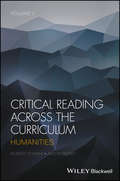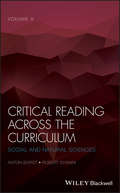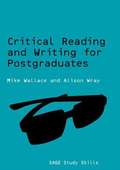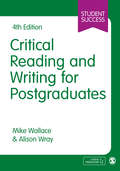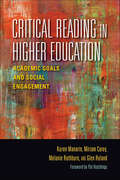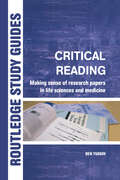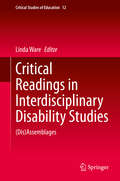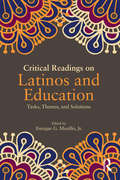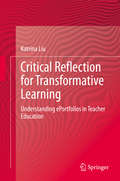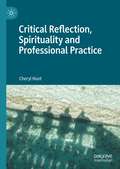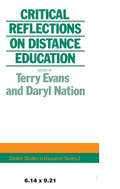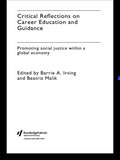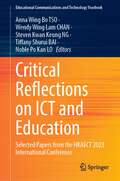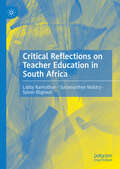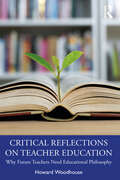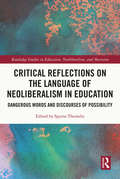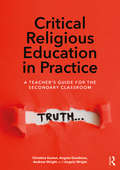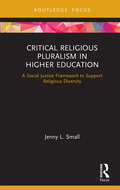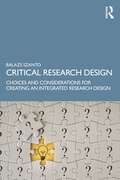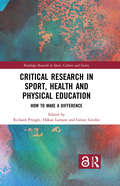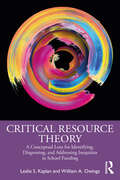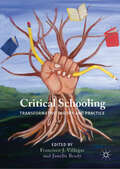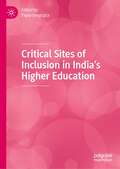- Table View
- List View
Critical Reading Across the Curriculum: Humanities
by Robert DiYanni Anton BorstPowerful strategies, tools, and techniques for educators teaching students critical reading skills in the humanities. Every educator understands the importance of teaching students how to read critically. Even the best teachers, however, find it challenging to translate their own learned critical reading practices into explicit strategies for their students. Critical Reading Across the Curriculum: Humanities, Volume 1 presents exceptional insight into what educators require to facilitate critical and creative thinking skills. Written by scholar-educators from across the humanities, each of the thirteen essays in this volume describes strategies educators have successfully executed to develop critical reading skills in students studying the humanities. These include ways to help students: focus actively re-read and reflect, to re-think, and re-consider understand the close relationship between reading and writing become cognizant of the critical importance of context in critical reading and of making contextual connections learn to ask the right questions in critical reading and reasoning appreciate reading as dialogue, debate, and engaged conversation In addition, teachers will find an abundance of innovative exercises and activities encouraging students to practice their critical reading skills. These can easily be adapted for and applied across many disciplines and course curricula in the humanities. The lifelong benefits of strong critical reading skills are undeniable. Students with properly developed critical reading skills are confident learners with an enriched understanding of the world around them. They advance academically and are prepared for college success. This book arms educators (librarians, high school teachers, university lecturers, and beyond) with the tools to teach a most paramount lesson.
Critical Reading Across the Curriculum: Social and Natural Sciences
by Robert DiYanni Anton BorstProvides educators with practical strategies, tools, and techniques for teaching critical reading skills to students in the social and natural sciences. Strong critical reading skills are an essential part of any student’s academic success. Teaching these vital skills requires educators to develop and implement effective teaching strategies, often based on their own critical reading practices. Critical Reading Across the Curriculum, Volume 2: Social and Natural Sciences provides educators with expert insights, real-world methods, and proven strategies to build critical reading skills in students across disciplines. Drawing from the experience of seasoned classroom practitioners, this book presents a dozen essays that offer various applications of critical reading best practices in fields such as anthropology, biology, economics, engineering, political science, and sociology. Clear, jargon-free chapters identify, explain, and illustrate best teaching practices for critical reading. Containing numerous practical examples and demonstrations, essays written by experts in their respective fields explain what critical reading requires for their discipline, as well as how to teach those skills in the classroom. Every essay includes a host of pedagogical activities, assignments, and projects that can be used directly or adapted for diverse teaching applications. This valuable book helps educators: Develop the skills students need to ask the right questions, consider sources, assess evidence, evaluate arguments, and reason critically Encourage students to practice critical reading skills with engaging exercises and activities Teach students to establish context and identify contextual connections Explain how to read for arguments, including content-based and conceptual arguments Adapt and apply teaching strategies to various curricula and disciplines Critical Reading Across the Curriculum, Volume 2: Social and Natural Sciences is an ideal resource for educators in a wide range of areas, such as college and high school instructors in science and social science disciplines and instructors of graduate education courses.
Critical Reading and Writing for Postgraduates
by Mike Wallace Alison Wray'A systematic, coherent approach to developing critical reading and writing skills that are applicable to a range of different levels of analysis and types of reading and writing tasks. The authors are to be commended for the clarity of their writing and the way scaffolded advice and tasks are integrated into the text. The book could form the core text for a course on critical reading and writing and a useful reference tool for the academic recently entered upon writing for publication.' - Educate Journal 'A very clear, accessible introduction that will be invaluable to postgraduate students trying to engage with reading and writing in a critical way' - R.M. Lee, Professor of Social Research Methods, Royal Holloway University of London This guide to critical reading and self-critical writing is a 'must-have' resource for postgraduate students and early-career academics. Packed with tools for analysing texts and structuring critical reviews, and incorporating exercises and worked examples drawn from the social sciences, the book offers step-by-step advice on how to: " read any text critically and analyse it in the depth appropriate to one's project " develop a self-critical approach to one's own academic writing " ask questions in order to evaluate authors' arguments " keep a review manageable by using focused review questions " structure a comparative review of multiple texts " build up a convincing argument " integrate critical literature reviews into a dissertation or thesis " make the transition from postgraduate to professional academic writer Essential reading for novice researchers, the book will also be invaluable for supervisors, methods course tutors, and academic mentors who teach and support the development of critical reading and self-critical writing skills.
Critical Reading and Writing for Postgraduates (Student Success)
by Mike Wallace Alison WrayReading critically, and writing using critical techniques, are crucial skills you need to apply to your academic work. If you need to engage with published (or unpublished) literature such as essays, dissertations or theses, research papers or oral presentations, this proven guide helps you develop a reflective and advanced critical approach to your research and writing. New to this edition: Two new chapters on basic and advanced writing skills More advice on self-bias and perception Updates and additional examples throughout Updated online resources providing additional support. A Companion Website provides additional resources to help you apply the critical techniques you learn. From templates and checklists, access to SAGE journal articles and additional case studies, these free resources will make sure you successfully master advanced critical skills.
Critical Reading and Writing for Postgraduates (Student Success)
by Mike Wallace Alison WrayReading critically, and writing using critical techniques, are crucial skills you need to apply to your academic work. If you need to engage with published (or unpublished) literature such as essays, dissertations or theses, research papers or oral presentations, this proven guide helps you develop a reflective and advanced critical approach to your research and writing. New to this edition: Two new chapters on basic and advanced writing skills More advice on self-bias and perception Updates and additional examples throughout Updated online resources providing additional support. A Companion Website provides additional resources to help you apply the critical techniques you learn. From templates and checklists, access to SAGE journal articles and additional case studies, these free resources will make sure you successfully master advanced critical skills.
Critical Reading in Higher Education: Academic Goals and Social Engagement (Scholarship of Teaching and Learning)
by Glen Ryland Melanie Rathburn Karen Manarin Miriam CareyFaculty often worry that students can't or won't read critically, a foundational skill for success in academic and professional endeavors. "Critical reading" refers both to reading for academic purposes and reading for social engagement. This volume is based on collaborative, multidisciplinary research into how students read in first-year courses in subjects ranging from scientific literacy through composition. The authors discovered the good (students can read), the bad (students are not reading for social engagement), and the ugly (class assignments may be setting students up for failure) and they offer strategies that can better engage students and provide more meaningful reading experiences.
Critical Reading: Making Sense of Research Papers in Life Sciences and Medicine
by Ben YudkinTextbooks are designed to teach, explain and make complex information easily understood and assimilated. Research papers do the reader no such favours. Being able to understand and use primary research is an essential tool in any scientific career. This book teaches these valuable skills simply and clearly, saving hours in the long run. Critical Reading explains how to: approach every paper methodically spot work aimed to support a pet theory gain confidence in questioning what you read be alert to bias use abstracts intelligently identify suspect experimental methods assess quantitative methodology interpret results with confidence draw inferences from published work. Using extracts from published Papers in Focus, this book imparts valuable know-how to students and researchers from any biomedical or biological discipline. The text is easily read and understood and the use of key points, summaries and reference reinforces good technique.
Critical Readings in Interdisciplinary Disability Studies: (Dis)Assemblages (Critical Studies of Education #12)
by Linda WareThis edited volume includes chapters on disability studies organized around three themes: Theory, Philosophy and Critique. Informed by a range of scholars who may or may not fashion their work beneath the banner of disability studies in explicit terms, it draws connections across a range of identities, knowledges, histories, and struggles that may, on the face of the text seem unrelated. The chapters are cross-categorical and interdisciplinary for purposes of complicating disability studies across international contexts and multiple locations that consider practice-oriented and intersectional approaches for analysis and advocacy. This integrative approach heralds more powerful ways to imagine disability and the conversation on disability.
Critical Readings on Latinos and Education
by Enrique G. MurilloThis critical anthology showcases an interdisciplinary forum of scholars sharing a common interest in the analysis, discussion, critique, and dissemination of educational issues impacting Latinos. Drawing on the best of the past 20 years of the Journal of Latinos and Education, the collection highlights work that has been seminal in addressing complex educational issues affecting and influencing the growing Latina and Latino population. Chapters discuss the production and application of wisdom and knowledge to real-world problems while engaging and collaborating with the interests of key stakeholders in other sectors outside the "traditional" academy. Organized thematically around issues related to policy, research, practice, and creative and literary works, the collection is sure to extend and encourage novel ways of thinking about the ongoing and emerging questions around the unifying thread of Latinos and education.
Critical Reflection for Transformative Learning: Understanding e-Portfolios in Teacher Education
by Katrina LiuThis book provides a research-based guide to using ePortfolios to develop critically reflective teachers capable of transformative learning for educational equity. It begins with a conceptualization of critical reflection in teacher education, then analyzes the social discourse of prospective teachers' teaching practice through their ePortfolio reflections, triangulated by classroom teaching observations and interviews. The results of the research show that prospective teachers’ reflections are performative and do not typically trigger transformative learning, in large part because of discrepancies in the structures of the ePortfolio, the goals of the teacher education program, and the mentoring and supervisory practices. With this analysis in hand, the book turns to practical questions, providing a transformative framework along with examples and tips for teacher educators to use the author’s methods to understand and analyze prospective teachers’ reflection and support their transformative learning.
Critical Reflection, Spirituality and Professional Practice
by Cheryl HuntThis book explores the concept and facilitation of critical reflection and its implications for professional practice. It draws on the author’s own extensive experience to demonstrate how reflective processes involving metaphor and imagery, as well as critique, can be used not only to understand and articulate key values underpinning professional practice and to generate new theoretical models, but to explore one's own worldview, including the ultimate question: 'Who am I?’. The author incorporates practical examples of reflection-through-writing and other reflective techniques which illustrate how ideas about critical reflection, transformative learning, authenticity and spirituality are intricately entwined within theories and practices of adult learning and professional development. The book highlights the importance of understanding the relationship between personal worldviews, values and professional practice. It draws on the concepts of vocation and professional psychological wellbeing to consider what it means to act authentically as a professional within an audit culture. The book will be invaluable for practitioners, academics and students interested in critical reflection, educational inquiry, autoethnography and the use of the self in and as research, the nature and use of metaphor, and the development of worldviews.
Critical Reflections On Dist.
by Terry EvansThis book suggests that apparently unrelated vignettes of Mikhail Gorbachev, Robert Mugabe, and Harold Wilson are closely connected and illustrates that the concept of distance education may be seen as one of those innovations which was forged on the frontier of European expansion overseas.
Critical Reflections on Career Education and Guidance: Promoting Social Justice within a Global Economy
by Barrie A. Irving Beatriz MalikFirst Published in 2004. Routledge is an imprint of Taylor & Francis, an informa company.
Critical Reflections on ICT and Education: Selected Papers from the HKAECT 2023 International Conference (Educational Communications and Technology Yearbook)
by Anna Wing Bo TSO Steven Kwan Keung NG Tiffany Shurui Bai Wendy Wing Lam CHAN Noble Po Kan LOThis book includes selected papers from the Hong Kong Association for Educational Communications and Technology (HKAECT) 2023 International Conference. It provides readers with a collection of insightful chapters which delves into the realms of data visualization, artificial intelligence (AI), virtual reality (VR), and augmented reality (AR). It also reflects on the dynamic shifts in online learning, blended learning, and self-directed learning. Part one of the volume includes case studies and examples of the integration of advanced technologies, such as data visualization, generative AI, and mixed reality in education. Part two shares experiences and observations from educators who embrace online learning, blended learning, and independent learning. Part three investigates the influences digital education has on learning, teaching, and society as a whole. The book paves a path for thought-provoking discussions on the future of education in a digitally connected world. It is a vital resource for educators, administrators, policymakers, and learners seeking to navigate and thrive in the rapidly evolving world of digital education.
Critical Reflections on Teacher Education in South Africa
by Labby Ramrathan Suriamurthee Maistry Sylvan BlignautThis edited volume focuses on Curriculum scholars' critical reflections on teacher education (TE) within South Africa to offer insights into critical considerations for the socio-economic, transformational, social and environmental justice and decolonization challenges that the country faces. Much of the literature on teacher education takes on a policy and practice focus to the exclusion of deep and fundamental curriculum questions on what is teacher education for, for whom, where and who decides. Within South Africa, the Minimum Requirements for Teacher Education Qualification (MRTEQ) forms the official policy that informs teacher education curriculum and certification to become a teacher. This volume raises critical and complicated questions for teacher educators and curriculum scholars to inspire a deeper understanding of teacher education beyond a set of parochial policy prescribed modules/courses that one needs to take to become a professional teacher.
Critical Reflections on Teacher Education: Why Future Teachers Need Educational Philosophy
by Howard WoodhouseCritical Reflections on Teacher Education argues that educational philosophy can improve the quality of teacher education programs in Canada, the United States, and the United Kingdom. The book documents the ways in which the market model of education propagated by governments and outside agencies hastens the decline of philosophy of education and turns teachers into technicians in hierarchical school systems. A grounding in educational philosophy, however, enables future teachers to make informed and qualified judgements defining their professional lives. In a clear and accessible style, Howard Woodhouse uses a combination of reasoned argument and narrative to show that educational philosophy, together with Indigenous knowledge systems, forms the basis of a climate change education capable of educating future teachers and their students about the central issue of our time.
Critical Reflections on Teacher Education: Why Future Teachers Need Educational Philosophy
by Howard WoodhouseCritical Reflections on Teacher Education argues that educational philosophy can improve the quality of teacher education programs in Canada, the United States, and the United Kingdom. The book documents the ways in which the market model of education propagated by governments and outside agencies hastens the decline of philosophy of education and turns teachers into technicians in hierarchical school systems. A grounding in educational philosophy, however, enables future teachers to make informed and qualified judgements defining their professional lives. In a clear and accessible style, Howard Woodhouse uses a combination of reasoned argument and narrative to show that educational philosophy, together with Indigenous knowledge systems, forms the basis of a climate change education capable of educating future teachers and their students about the central issue of our time.
Critical Reflections on the Language of Neoliberalism in Education: Dangerous Words and Discourses of Possibility (Routledge Studies in Education, Neoliberalism, and Marxism)
by Spyros ThemelisRecognizing the dominance of neoliberal forces in education, this volume offers a range of critical essays which analyze the language used to underpin these dynamics. Combining essays from over 20 internationally renowned contributors, this text offers a critical examination of key terms which have become increasingly central to educational discourse. Each essay considers the etymological foundation of each term, the context in which they have evolved, and likewise their changed meaning. In doing so, these essays illustrate the transformative potential of language to express or challenge political, social, and economic ideologies. The text’s musings on the language of education and its implications for the current and future role of education in society make clear its relevance to today’s cultural and political landscape. This exploratory monograph will be of interest to doctoral students, researchers, and scholars with an interest in the philosophy of education, educational policy and politics, as well as the sociology of education and the impacts of neoliberalism.
Critical Religious Education in Practice: A Teacher's Guide for the Secondary Classroom
by Angela Wright Andrew Wright Christina Easton Angela GoodmanCritical Religious Education in Practice serves as an accessible handbook to help teachers put Critical Religious Education (CRE) into practice. The book offers straightforward guidance, unpicking some of the key difficulties that teachers encounter when implementing this high-profile pedagogical approach. In-depth explanations of CRE pedagogy, accompanied by detailed lesson plans and activities, will give teachers the confidence they need to inspire debate in the classroom, tackling issues as controversial as the authority of the Qur’an and the relationship between science and religion. The lesson plans and schemes of work exemplify CRE in practice and are aimed at empowering teachers to implement CRE pedagogy across their curriculum. Additional chapters cover essential issues such as differentiation, assessment, the importance of subject knowledge and tips for tackling tricky topics. The accompanying resources, including PowerPoint presentations and worksheets, are available via the book’s companion website. Key to developing a positive classroom culture and promoting constructive attitudes towards Religious Education, this text is essential reading for all practising and future teachers of Religious Education in secondary schools.
Critical Religious Pluralism in Higher Education: A Social Justice Framework to Support Religious Diversity (Routledge Research in Higher Education)
by Jenny L. SmallThis text presents a new critical theory addressing religious diversity, Christian religious privilege, and Christian hegemony in the United States. It meets a growing and urgent need in our society—the need to bring together religiously diverse ways of thinking and being in the world, and eventually to transform our society through intentional pluralism. The primary goal of Critical Religious Pluralism Theory (CRPT) is to acknowledge the central roles of religious privilege, oppression, hegemony, and marginalization in maintaining inequality between Christians and non-Christians (including the nonreligious) in the United States. Following analysis of current literature on religious, secular, and spiritual identities within higher education, and in-depth discussion of critical theories on other identity elements, the text presents seven tenets of CRPT alongside seven practical guidelines for utilizing the theory to combat the very inequalities it exposes. For the first time, a critical theory will address directly the social impacts of religious diversity and its inherent benefits and complications in the United States. Critical Religious Pluralism in Higher Education will appeal to scholars, researchers, and graduate students in higher education, as well as critical theorists from other disciplines.
Critical Research Design: Choices and Considerations for Creating an Integrated Research Design
by Balazs SzantoThis student friendly book demonstrates how to take a critical approach to the research design process, to create feasible, original, and critical research works.The author uses a unique model that incorporates three critical review cycles: methodological design, epistemology, and completed research plan, in order to ensure that readers have critically engaged with various components of the research proposal. Approaching research design as a coherent whole, this book focuses on critically understanding how the various components come together as a cohesive and interconnected design, as well as to explore how the same basic research idea can lead to a number of different research designs. Including sections on both conceptual and methodological designs, readers are equipped with the skills and knowledge needed to take a basic research idea and conceptualize a complete and organic design for a research based on it that can make an original contribution to the existing body of knowledge.Covering quantitative, qualitative, and mixed methods approaches, and addressing the ethical implications of research, this is an essential resource for researchers, instructors, and students across a broad range of disciplines in the social and behavioral sciences and humanities.
Critical Research in Sport, Health and Physical Education: How to Make a Difference (Routledge Research in Sport, Culture and Society)
by Göran Gerdin Richard Pringle Håkan LarssonWithin the overlapping fields of the sociology of sport, physical education and health education, the use of critical theories and the critical research paradigm has grown in scope. Yet what social impact has this research had? This book considers the capacity of critical research and associated social theory to play an active role in challenging social injustices or at least in ‘making a difference’ within health and physical education (HPE) and sporting contexts. It also examines how the use of different social theories impacts sport policies, national curricula and health promotion activities, as well as the practices of HPE teaching and sport training and competition. Critical Research in Sport, Health and Physical Education is a valuable resource for academics and students working in the fields of research methods, sociology of sport, physical education and health. Chapter 5 of this book is freely available as a downloadable Open Access PDF at http://www.taylorfrancis.com under a Creative Commons Attribution-Non Commercial-No Derivatives (CC-BY-NC-ND) 4.0 license.
Critical Resource Theory: A Conceptual Lens for Identifying, Diagnosing, and Addressing Inequities in School Funding
by Leslie S. Kaplan William A. OwingsCritical Resource Theory (CReT) offers an innovative critical perspective on education funding. This new conceptual lens enables school leaders and policy makers to analyze quantitatively school funding policies and practices as a catalyst to make them more equitable. It offers a useful orientation and tool to increase fairness and opportunity in a society that systemically advantages the dominant group with ample resources while it disadvantages others by withholding them. Presenting a balance between the theoretical and its practical application to improve educational outcomes for marginalized children, chapters introduce and discuss this new extension of Critical Theory, validate it as a value-added and complete theory, place it within a broader philosophical framework, and construct its historical, social, political, and educational contexts. Designed for use in school finance and educational policy courses, this book presents an analytical tool that leaders, scholars, and policy makers can use to alter how they view public funding policies and practices – to question their assumptions about funding and resource allocations, look for, identify, and assess inadequacies and inequities, share their findings, and use these data to shape policy recommendations for increased fiscal fairness and improved student outcomes.
Critical Schooling: Transformative Theory And Practice
by Francisco J. Villegas Janelle BradyThis edited volume brings to the foreground the inequities of contemporary schooling in Canada. The editors and authors perform a critical examination of the Canadian schooling space, highlighting the agency and action of marginalized communities and their efforts to address injustice within contexts of schooling. Grounded in the unique perspective of each author, this book provides a venue for transformative practice to create inclusive and socially just contexts for diverse populations, specifically as experienced by peoples who inhabit the intersections of various modes of oppression.
Critical Sites of Inclusion in India’s Higher Education
by Papia SenguptaThis book acquaints the reader to the often invisible-ized practices and policies under the rhetoric of ‘inclusion’, through theoretical and empirical analysis. It emphasizes on the complexities of education policies in a multicultural state by identifying the challenges to the idea of ‘inclusion’ illuminated through judicial interventions, policy-frameworks and everyday experiences of individuals. Higher education is imperative to empowerment in socially stratified societies marred with deep inequalities like India and many other multicultural countries. Disputes over inclusion remains a critical feature in Indian higher education sector, as it is viewed as facilitating access to economic opportunities and providing vertical mobility for individuals belonging to marginalized communities. Higher education empowers, and expands individual horizons of thought and ideas of freedom, dignity, equality, enabling individuals to participate actively in the political-sociological discourses in democratic polity. Therefore, policy makers, political theorists and educationists have been examining the question of inclusion and education as public-good. Contemporary India has witnessed an unprecedented attack on academic freedom, free exchange of ideas and expressions, challenging the very idea of inclusion and inclusiveness.
